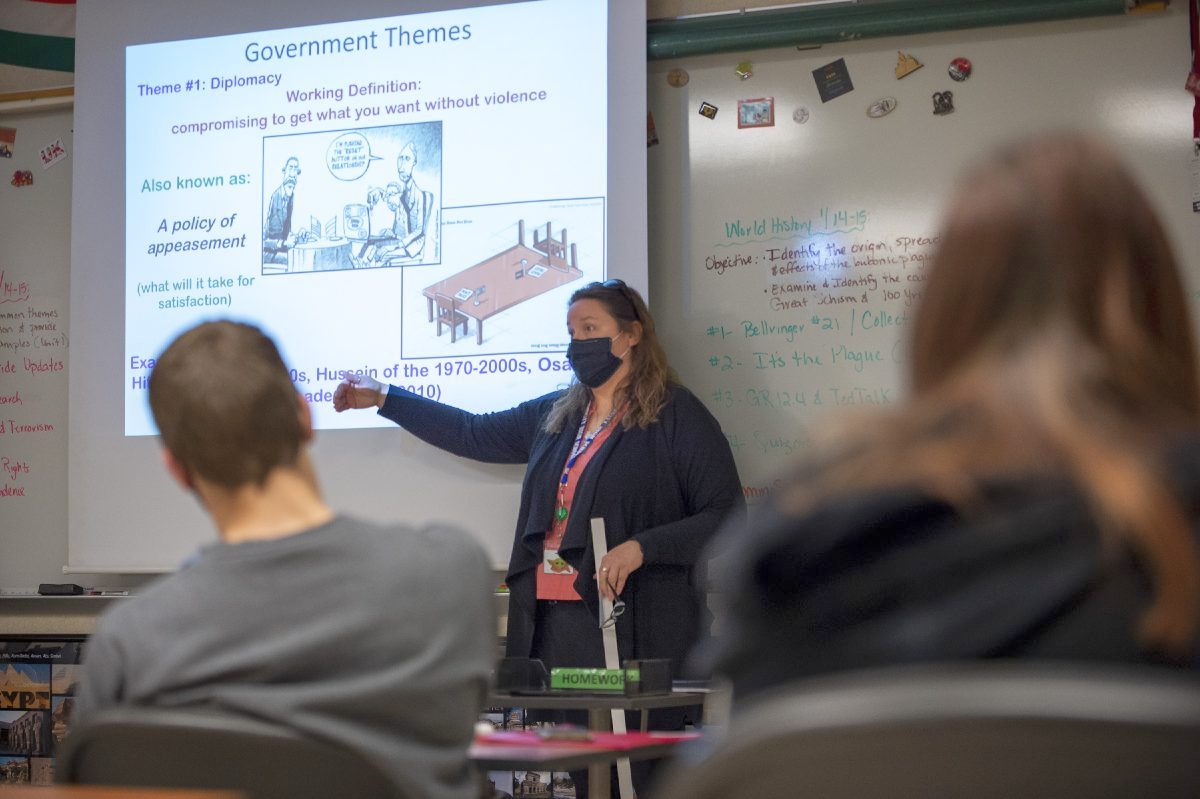<p><strong>T</strong>he world watched live as violent riots unfolded last week at the U.S. Capitol.</p><p>Nearly 600 miles away, Johnson County social studies teachers grappled with how to explain what happened to their students less than 24 hours later.</p><p>Two local teachers decided they would let their students take the wheel.</p>[sc:text-divider text-divider-title="Story continues below gallery" ]Click here to purchase photos from this gallery<p>Kat Sarles, a world history and U.S. government teacher at Franklin Community High School, approached discussions with her students in a sterilized way. As a class, they reviewed the events that unfolded, from President Donald Trump’s speech to supporters, to a group of protestors violently breaching the Capitol building, which resulted in at least five deaths.</p><p>“This incident has a lot of subjective perspectives involved. This was more about political personalities than the actual function of government. You have to be careful with those conversations,” Sarles said.</p><p>She let students lead a discussion about different perceptions of the Capitol insurrection, and allowed them to ask questions to help them understand what happened.</p><p>“There were legitimate questions like, ‘What does this mean? Has this ever happened in history?’” Sarles said.</p><p>Doug Ellington, an 8th grade U.S. history teacher at Greenwood Middle School, took a similar approach, letting his students lead discussions about what happened and what it will mean for democracy.</p><p>Ellington served as a facilitator, only interjecting to answer questions, ask more questions or correct historical inaccuracies.</p><p>“It didn’t evolve into a debate. I told them we weren’t going to debate political stances.</p><p>I wanted them to speak more to how should a democracy work, and what you do you’re upset with a democracy,” Ellington said.</p><p>Making sense of a violent siege of the Capitol to 13 and 14 year olds may seem like it would be difficult, but Ellington’s students showed a strong understanding of the implications of the event.</p><p>In their discussions, students brought up the pictures that circulated online showing the National Guard deployed for Black Lives Matter protests last summer in Washington, D.C.</p><p>“They said, ‘That’s definitely racism, Mr. Ellington, because it was handled in a completely different fashion,’” he said. “Sometimes young minds can see even the simplest things and point them out.”</p><p>For teachers, talking about political events in the classroom is like navigating a minefield because there is a fine line to walk — informing students without subconsciously pushing certain views. Sarles always tries to remain balanced and keeps her personal and professional life separate, she said.</p><p>“I keep in mind the room is filled with young voters. My job is to encourage them to be voters, to become active, informed members of the population,” Sarles said.</p><p>There is no denying the siege of the U.S. Capitol will be in history books, but it will not serve as a standalone lesson beyond the discussions that took place right after it happened, both Sarles and Ellington said.</p><p>Ellington will likely add it as a supplement to his lessons about the Constitution and the functions of democracy. Like many major historical events, this one will lose its direct impact over time, and fewer students will remember it through the years, he said.</p><p>“I don’t think it will be a standalone event, but it’s definitely something we’re going to refer to because it’s in kids’ background knowledge now. It’s amazing how out of date things get when teaching in school. It’s big to get on right now and talk about, until the next thing comes,” Ellington said.</p><p>It could change how teachers talk to students about political engagement and the Constitution, he said.</p><p>“Kids, they kind of snooze on a lot of that … maybe that has to do with teachers and how we teach it. Maybe it should be more about application instead of just memorizing things,” he said.</p><p>It is not likely the insurrection will set a precedent for how grievances with the government are handled in the future, Sarles said. She explained to her students that resorting to violence is not how America or democracy works.</p><p>“We have a rough paragraph in our history now,” she said. “I don’t think this is a mark of how we will conduct ourselves in the future. This is an anomaly.”</p>
Nobody covers Johnson County and the surrounding areas like the Daily Journal.
30 S. Water St., Second floor, Suite A, Franklin, IN 46131
Phone: (317) 736-7101
Toll free: (888) 736-7101
All text, photos, graphics, artwork and other material on this site are copyrighted and may not be published, broadcast, rewritten or redistributed without permission.
Contact us: [email protected]
© Copyright AIM Media Indiana, LLC





